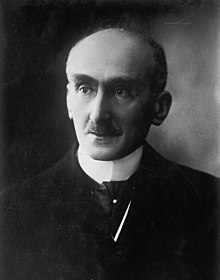
Back Henri Bergson Afrikaans Henri Bergson AN هنري برجسون Arabic هنرى برجسون ARZ Henri Bergson AST Henri Bergson AVK आन्रि बर्गसां AWA Anri Berqson Azerbaijani Анры Бергсон Byelorussian Анры Бэргсон BE-X-OLD
Henri Bergson | |
|---|---|
 Bergson in 1927 | |
| Born | Henri-Louis Bergson 18 October 1859 Paris, Second French Empire |
| Died | 4 January 1941 (aged 81) Paris, German-occupied France |
| Alma mater | |
| Notable work |
|
| Spouse |
Louise Neuberger (m. 1891) |
| Awards | Nobel Prize in Literature (1927) |
| Era | 20th-century philosophy |
| Region | Western philosophy |
| School | |
| Institutions | Collège de France |
Main interests | |
Notable ideas | |
| Signature | |
 | |
Henri-Louis Bergson (French: [bɛʁksɔn]; 18 October 1859 – 4 January 1941) was a French philosopher,[8][9][10][11][12] who was influential in the traditions of analytic philosophy and continental philosophy, especially during the first half of the 20th century until the Second World War,[13] but also after 1966 when Gilles Deleuze published Le Bergsonisme. Bergson is known for his arguments that processes of immediate experience and intuition are more significant than abstract rationalism and science for understanding reality.
Bergson was awarded the 1927 Nobel Prize in Literature "in recognition of his rich and vitalizing ideas and the brilliant skill with which they have been presented".[14] In 1930, France awarded him its highest honour, the Grand-Croix de la Legion d'honneur. Bergson's great popularity created a controversy in France, where his views were seen as opposing the secular and scientific attitude adopted by the Republic's officials.[15][need quotation to verify]
- ^ John Ó Maoilearca, Beth Lord (eds.), The Continuum Companion to Continental Philosophy, Bloomsbury Academic, 2009, p. 204.
- ^ "Process Philosophy". Process Philosophy (Stanford Encyclopedia of Philosophy). Metaphysics Research Lab, Stanford University. 2022.
- ^ Ford, Russell (2004), 'Immanence and Method: Bergson's Early Reading of Spinoza,'. The Southern Journal of Philosophy 42(2): 171–92. doi:10.1111/j.2041-6962.2004.tb00995.x
- ^ Astesiano, Lionel: Joie et liberté chez Bergson et Spinoza. (Paris: CNRS Éditions, 2016)
- ^
Hancock, Curtis L. (May 1995). "The Influence of Plotinus on Berson's Critique of Empirical Science". In R. Baine Harris (ed.). Neoplatonism and Contemporary Thought. Congress of the International Society for Neoplatonic Studies held in May 1995 at Vanderbilt University. Vol. 10. International Society for Neoplatonic Studies. Albany: State University of New York Press. p. 139ff. ISBN 978-0-7914-5275-2. Retrieved 10 May 2010.
That the philosophy of Henri Bergson is significantly influenced by the doctrines of Plotinus is indicated by the many years Bergson devoted to teaching Plotinus and the many parallels in their respective philosophies. This influence has been discussed at some length by Bergson's contemporaries, such as Emile Bréhier and Rose-Marie Rossé-Bastide. ...
- ^ R. William Rauch, Politics and Belief in Contemporary France: Emmanuel Mounier and Christian Democracy, 1932–1950, Springer, 2012, p. 67.
- ^ Sorel, Georges. "Preface by Jeremy Jennings". Reflections on violence.
- ^ Gelber, Nathan Michael (1 January 2007). "Bergson". Encyclopaedia Judaica. Archived from the original on 29 March 2015. Retrieved 7 December 2015.
- ^ Dynner, Glenn (2008). Men of Silk: The Hasidic Conquest of Polish Jewish Society. Oxford University Press. pp. 104–105. ISBN 978-0195382655.
- ^ Henri Bergson. 2014. Encyclopædia Britannica Online. Retrieved 13 August 2014, from https://www.britannica.com/EBchecked/topic/61856/Henri-Bergson
- ^ "Z ziemi polskiej do Nobla" [From the Polish lands to the Nobel Prize]. Wprost (in Polish). Warsaw: Agencja Wydawniczo-Reklamowa Wprost. 4 January 2008. Retrieved 10 May 2010.
Polskie korzenie ma Henri Bergson, jeden z najwybitniejszych pisarzy, fizyk i filozof francuski żydowskiego pochodzenia. Jego ojcem był Michał Bergson z Warszawy, prawnuk Szmula Jakubowicza Sonnenberga, zwanego Zbytkowerem (1756–1801), żydowskiego kupca i bankiera. [Translation: Henri Bergson, one of the greatest French writers, physicists and philosophers of Jewish ancestry, had Polish roots. His father was Michael Bergson from Warsaw, the great-grandson of Szmul Jakubowicz Sonnenberg – known as Zbytkower – (1756–1801), a Jewish merchant and banker.]
- ^ Testament starozakonnego Berka Szmula Sonnenberga z 1818 roku Archived 28 September 2011 at the Wayback Machine
- ^ Merquior, J. G. (1987). Foucault (Fontana Modern Masters series), University of California Press, p.11. ISBN 0-520-06062-8.
- ^ "The Nobel prize in Literature". Retrieved 15 November 2010.
- ^ Robert C. Grogin, The Bergsonian Controversy in France, 1900–1914, Univ of Calgary Press (May 1988), ISBN 0919813305
© MMXXIII Rich X Search. We shall prevail. All rights reserved. Rich X Search